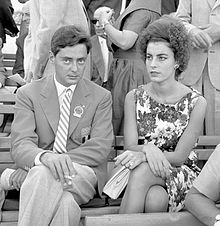Umberto Agnelli
Like his brother and his grandfather, Giovanni Agnelli, who cofounded Fiat S.p.A. in 1899,[8][9] he also carried out his military service at the Pinerolo Cavalry Application School.
[12] Engaged for a long time in the Fiat restructuring process, with the simultaneous opening towards foreign capital and markets, Agnelli and his family were listed 278th in the 2003 Forbes ranking of the richest people in the world, with an estimated net worth of around US$1.5 billion.
Although he was a senior executive at Fiat, Agnelli was sidelined from taking a leadership role by his older brother,[13] whom he had supported for a long time in the management of the family company even if often forced to remain on the bench for financial power games, until the latter's death in 2003.
Compared to the past, he decided to change his strategy by concentrating all Fiat resources on the car and turning to an external manager, Giuseppe Morchio, to whom he would entrust the leadership of the company.
[25] Elected in 1955 by a council of members, including his older brother, who was president of the club, he became the youngest person to assume the highest managerial position in the history of Juventus.
His management was characterized by the signings of important players, such as John Charles and Omar Sívori, who proved to be decisive for the conquest of three Serie A championships and two consecutive Coppa Italias from 1958 to 1961.
[36] When Agnelli died in 2004, Juventus had won the 2001–02 Serie A, the club's 26th scudetto, at the last matchday,[37][38][39] and had reached the 2003 UEFA Champions League final, the club's four UEFA Champions League final in seven years, three of which were achieved consecutively; those in 1997, against Borussia Dortmund,[40][41] and in 1998, against Real Madrid,[42] were lost out controversially.
It took ten years to recover and return to the top Italians, not yet Europeans: now the club makes over €300 million, but in the meantime Real, Bayern, and the others have taken off.
"[44] Some observers allege that Calciopoli and its aftermath were a dispute within Juventus and between the club's owners that came after the deaths of Umberto and Gianni Agnelli,[45] including Franzo Grande Stevens and Gianluigi Gabetti who favoured Agnelli's grandson, John Elkann, over his nephew as chairman,[46] and wanted to get rid of Luciano Moggi, Antonio Giraudo,[47][48] and Roberto Bettega, whose shares in the club increased.
The third son was Giovanni Alberto Agnelli,[69] who grew up to be the head of the maternal family-firm Piaggio, and was being groomed to succeed at Fiat but died of cancer at the age of 33 in 1997.
The ladies come from a noble family dating back to the Kingdom of Naples that has, among others, the titles of nobility of Prince of Castagneto and Duke of Melito.
[74][75] Suffering from lung cancer, which became public only a month before his death after a Financial Times report,[76] Agnelli spent his last days assisted by his wife and two children at their residence in La Mandria,[77] which included La Mandria Regional Park, in the Venaria Reale area, where he died on 27 May 2004,[78] fifteen days before the death of his nephew, Prince Egon von Fürstenberg.
His last public appearance had taken place on 26 April, when his wife was awarded an honorary degree in veterinary medicine by the University of Turin.

